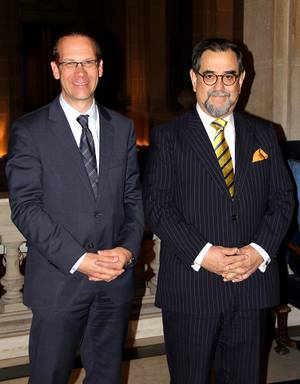|
28.07.2014
Download the press release / PDF 150KBSantiago de Chile and Geneva – Chile has started the countdown to the Fifteenth Meeting of the States Parties of the Anti-Personnel Mine Ban Convention, or Ottawa Convention, which will be held in Santiago in late 2016. The Fifteenth Meeting of the States Parties is an international diplomatic conference that will see around 1,000 delegates descend on Chile’s capital to take stock of global efforts to eradicate anti-personnel mines and to guarantee the rights of landmine survivors. Senior officials from Chile’s Ministry of Foreign Affairs and its National Demining Commission met with the Director of the Convention’s Geneva-based secretariat, or Implementation Support Unit (ISU) to discuss substantive and organizational preparations for the major international conference.
“The Ottawa Convention has set an example for other disarmament treaties and has proven that States and civil society can work together effectively to end the suffering caused by anti-personnel mines. We stand ready to welcome the world in Santiago in 2016.” “Chile is an example of the success of the Convention,” said Kerry Brinkert, the Director of the Convention’s Implementation Support Unit. “Chile, over a decade ago, destroyed its stockpile of almost 300,000 anti-personnel mines and has removed and destroyed almost half of the anti-personnel and anti-vehicle mines that were planted in the past. Chile is also well on track to complete the clearance of all mined areas by its 1 March 2020 Convention deadline, which serves as an example that eliminating landmines can be achieved.” “The meeting of the Convention in Santiago will illustrate the tremendous efforts undertaken by Chile at a national level and Latin America as a region, to end the suffering and casualties caused by anti-personnel mines,” added Kerry Brinkert. “Each affected Central American country has been cleared of all mined areas and Peru and Ecuador are set to complete their demining efforts in 2017.” “When Chile presides over the Convention, it will place special emphasis on assistance to landmine victims,” said Ambassador Alfredo Labbé. “We must continue to build bridges between our efforts to support landmine survivors and broader international efforts to guarantee the rights of persons with disabilities. This is important as, when survivors of landmines and other explosive devices acquire a disability, their rights fall under the scope of the Convention on the Rights of Persons with Disabilities.” The Anti-Personnel Mine Ban Convention was adopted in Oslo in 1997, opened for signature in Ottawa the same year and entered into force on 1 March 1999. To date, 161 States have joined the Convention, including every State in the Americas except Cuba and the United States. Since entering into force, millions of square metres of once dangerous lands have been released for normal human activity and approximately 47.5 million stockpiled mines have been destroyed. The Anti-Personnel Mine Ban Convention’s last formal meeting in the Americas took place in 2009 in Cartagena, Colombia. For press inquiries, contact: Laila Rodriguez press(at)apminebanconvention.org, +41 (0) 22 730 9350. Find the Convention on Facebook, Flickr and Twitter. |


 “Chile is honored to host and preside – in 2016 – over one of the most important international disarmament and humanitarian treaties,” said Ambassador Alfredo Labbé, the Director General of Foreign Policy at Chile’s Ministry of Foreign Affairs.
“Chile is honored to host and preside – in 2016 – over one of the most important international disarmament and humanitarian treaties,” said Ambassador Alfredo Labbé, the Director General of Foreign Policy at Chile’s Ministry of Foreign Affairs.